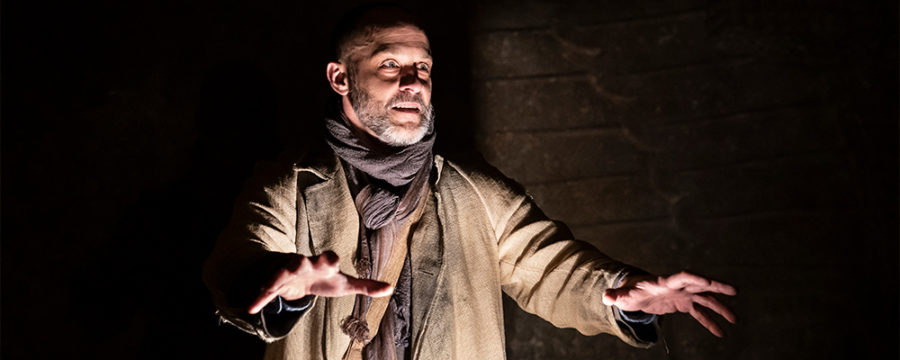An Iliad, a Court Theatre production originally performed in March 2020 and made available this spring for virtual viewing, takes advantage of its unique setting in the galleries of the Oriental Institute for a modern retelling of Homer’s epic story. Drawing in even those usually put off by traditional translations of ancient epics, An Iliad allows the viewer to grieve for those long dead by placing them into a modern context. Additionally, humor brings the story of the Iliad to life and into modernity. The story’s retelling by the Poet (Timothy Edward Kane) is updated with modern language, yet the emotional connection to the ancient epic is never lost.
Kane delivers a stunning performance as the Poet: He recounts the story naturally, with the modern and ancient language feeling equally at home in his interpretation. His performance stands on the brink of insanity, driven mad by the tale of death and destruction he has to recount time and time again. His movements, both subtle and sweeping, make good use of the institute and of the audience members around him. Kane dances his way around ancient artifacts and audience members, even running through the institute at several points in the play, beckoning the audience members to join him. At the same time, Kane gives a nuanced, emotional performance that, while surely more captivating in person, stands out on camera regardless. He takes on each character with grace––he becomes Achilles, Agamemnon, Hector, Patroclus, and even the gods, bringing them to life while adding touches of the Poet’s erratic personality throughout.
The production design of An Iliad is minimalist yet powerful. The set design is minimal, inviting the audience to take in the museum’s artifacts and sculptures instead. The music, when used, is subtle, adding a sense of foreboding in a tragic tale. The lighting of the play, too, adds much to the production. In the light, the Poet changes form—at different points in the play, he looks inviting, personable, and foreboding. The light cast onto the actor portrays grief, anger, and fire, and as it changes angle and color, looming shadows are cast on the ancient objects of the museum. Everything about the production is dynamic and continually moving, bringing an ancient story and the artifacts in the institute to life.
In some ways, the virtual format of the play adds to the performance––of course, the play is now more widely accessible, and captions are available, unlike in a traditional performance. Instead of sitting in the museum during the production, the viewer instead has to interpret the play through the camera, which becomes a kind of audience member itself. The virtual audience misses none of the dynamism of the play––the camera becomes a part of the performance, following the Poet around the room and changing angles to match the mood of the story.
As for the staging of the play, the ancient artifacts of the Oriental Institute stand as a reminder of the weight of the story. As Kane describes in the production program, “To be surrounded by what’s left of those once mighty civilizations puts in perspective the timelessness of the enduring qualities of humans.” Above all, An Iliad is a story of love, death, and grief. Not only a poignant interpretation of an ancient tale, the play also becomes a commentary on society that is expertly extended to all of human history, well into the modern day. In one of the most powerful scenes of the play, the Poet lists wars throughout history up to the point the play was produced by Court Theatre last year and calls to mind the destructive power of war over the centuries, whether it be to Troy, to Hiroshima, or to Aleppo. As Kane comments, “Those beautifully curated displays also represent vanity, jealousy, and a hunger for power. Homer was telling this story when all those things were shiny and new, yet here we are struggling with the same questions.”
An Iliad was created by Lisa Peterson and Denis O’Hare and directed by Charles Newell.










